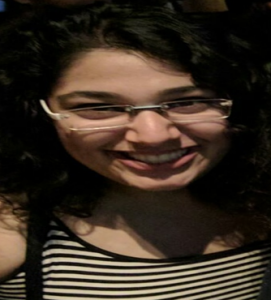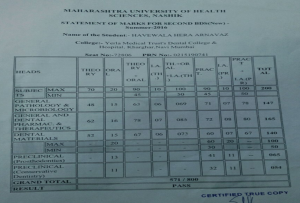Hera Havewala

Y. M. T. DENTAL COLLEGE
SUMMER 2016
II YEAR TOPPER
1.Congratulations on achieving such an amazing feat. Tell us a bit about yourself. Please also tell us your individual marks in each subject.
Thank you so much! It was a little overwhelming for me too, haha. I’m Hera Havewala, now in 3rd year BDS at YMTDC, Kharghar.
I got 147/200 in Micro Patho, 165/200 in Pharmac, 140/200 in Dental Materials, 65/100 in preclinical Prosthodontics, and 54/100 in preclinical Conservative dentistry.
2.So, when all of this is new and the rest of us are still busy figuring the head and tail of the subject, how did you tackle and master the syllabus?
Quite honestly, I didn’t realize at first how hard 2nd year can be, because 1st year didn’t seem that hard to pass. I took it very lightly until one of my teachers gave me a wake up call and encouraged me, saying I had to study, I couldn’t pass MUHS like I had in my first internals. She thought I had it in me to study and do much better, so I gave it a shot and found I genuinely loved what I was studying! I used to spend my free time googling things about Pharmac and Pathology, I asked a lot of questions to my teachers, if anyone fell sick I used to immediately ask them what they’re taking, and what problem they have. I still do that! My non medical friends have a hearty laugh about it. A sir of ours now tells us this about Oral Pathology (which we have in 3rd year) but I find it holds true for any and every subject. You can’t study it unless you really love it. And when you love it, you’ll automatically develop interest and find it very easy to study! My teachers were another reason. They took a lot of interest in us and our work, especially in preclinics. Their methods at the time may have seemed a bit strict, but it’s only now that we realize it did us good.
3.Did you have a set schedule, a time table that you stuck to? What were the daily hours that you put in self study ?
I’m honestly horrible with schedules? I’d decided after my 1st internals that I’d make a dedicated schedule, but that never happened. I pushed the decision to 2nd internals, prelims, PL, and I still didn’t have schedule? what I did was, I’d decide on a particular subject for the day, open up the book, decide on a topic that I liked most, and start with that. but yes, I did study Pharmac and dental materials on a regular basis, reading up whenever I got the time, so that I could manage Patho Micro last minute. In PL, I used to study a variable amount of hours everyday, depending on my capacity. Average was about 8 hours a day of dedicated studying. I always made sure I took breaks often, went out with friends. I can safely say I didn’t lock myself in during PL. I did have fun, because that’s essential too.
“Never leave a question unattempted. Write one line, two, write a definition, draw a diagram, do anything that is relevant to the question asked.”
4.Did you have a different methodology of tackling the subjects? Any special notes that you prepared?
Yes. I made a lot of notes! Especially in Patho during PL, and in Pharmac for the classifications, and DM too. I found it essential to make notes at least in Patho and DM, because the prescribed books were huge and while they were interesting to read for gaining knowledge, from the exam point of view it was easier to study with notes. Also, there were more than one book I referred to for these subjects, I had googled a lot of things that I didn’t understand, so I amalgamated all of that into notes.
Patho and Micro together was a very vast syllabus, and admittedly, I didn’t study it all. Just looking at Harsh Mohan was overwhelming! I did what I thought was very important, and probable questions.
In dental materials and Pharmac, I made sure I studied regularly, because Pharmac is extremely volatile, and I found it unmanageable at the last minute, and Dental Materials we used to have regular use of them in preclinics, we used to get asked a lot of questions, so I thought I needed to brush up often.
That was the reason I had a very calm, peaceful PL?
5.Do you have any special pointers for specific subjects? The do’s and don’ts of it?
One of the major pointers I have is start studying in advance. Honestly, it saves a lot of hassle and ensures peace of mind. Especially Pharmac. My first internals was a horrifying experience with respect to Pharmac because I thought “Oh, it’s just medicines, I can manage”. Didn’t happen? and though the portion in internals is tiny compared to the MU, it was like climbing a mountain. And you’ll tend to get confused with the drug names unless you’ve gone through them thoroughly. The important topics like Peptic Ulcer, Antihypertensives, stuff like that, keep reading up on so it gets hardwired in your brain. In PL you can read up on the lesser asked topics, it’ll be manageable then.
In DM-
Read the prescribed books. Talk to your teachers if you find Philip’s hard to understand. Because reading from digests and other books that are exam oriented may just leave you clueless in viva, and ahead on when you’re handling the materials. Philips and the other books, if read seriously, have a lot of small things you’d miss out on, which can be asked in vivas and you’ll end up running in circles trying to figure out what the examiner wants exactly. And since Philips is a standard book, you can always quote it.
Refer to 2-3 sources if you find Philip’s tough to understand. Google topics- SlideShare has some really good presentations for dental materials.
And, make notes. Notes are very very valuable in dental materials, even later on when you get to 3rd year you’ll have vivas in your clinics, you can just go through them real quick.
In Micro, I didn’t think notes were that essential because the book was very concise, to the point and easy to understand.
but in Patho, make notes for important topics, because otherwise the syllabus is too vast to finish?
my senior gave me another great tip- she used to fold down corners of pages that were important. In PL when I found Patho unmanageable, I found it much easier to just flip through the book and read the pages she’d turned down. Like, in Anemia she’d folded down the important ones, like Iron Deficiency and Pernicious. She’d folded down the stains for amyloid, which turned out to be an SAQ for us. That was very helpful for last minute studying.
Another pointer that may help is to talk to your teachers and listen carefully when they teach. You may not be able to attend that much, with the load of preclinics and so many submissions, but before MU, it always makes sense to discus with friends or with teachers.
6.Was there any help that you acquired while exam preparation? Like any visual aids any professional guidance? Or those little tit bits that the professors tell us but none other than the toppers pay attention to? Please share with us.
Well, yes. SlideShare was a huge help, as was Google. While you obviously cannot quote these websites to your teachers when you answer them, you find some very interesting study material on there. In the PL, when I had a doubt about something, I’d just literally Google the doubt and read up on it. Using online sources not only makes studying more easy for our generation, it also breaks the monotony of a book. I also Youtubed a lot before my preclinical exams, just to brush up on the techniques of preparation and tooth setting, because practicals are something you’ll be good at if you do it regularly, but during the long PL and following exams, I’d been completely out of touch with preclinics. So that helped me brush up so I could go about my exams with a little more surety.
7.How vital is the Question bank during exams? Does it come highly recommended or you advice thorough reading of the text and having confound knowledge of the subject?
Oh the question bank is to us what 100 rupee notes are to the common public after demonetization- _extremely_ useful!
the syllabus is vast, the syllabus is tough, the syllabus is enough to give you sleepless nights if you’re as easily scared as I am. Having the question bank was a slight consolation, atleast if nothing else I’d prepare the questions that had been previously asked. There always will be instances where a random question will come out of nowhere, like our LAQ for pathology that left us very very confused and very scared about passing, but mostly, questions _do_ come from the past papers. And seeing those questions you know what you should study, whats expected, what may come. It’s comforting, and it’s a starting point. But yes, I also think that one should read a little beyond the question bank too, because it’ll always help. If not in the exam, then later in life. And reading beyond the question bank also ensures a smoother viva.
8.How do you propose the students study and what kind of discipline should be followed during exam time?
If there’s one word I could use to sum up how to study, it’d be- _regularly_. At least 2nd year onwards, regular study is needed. Not like get home everyday and sit with your books seriously and swat for 2 hours, no. But atleast read up on topics throughout the year, or atleast during internals. Even if you manage to cover roughly 3/4th of the syllabus of every internal properly, you won’t have to struggle in PL. Take internals seriously, if not to score well, atleast to pass. Sure, if you don’t cut the required ratio nothing serious will happen as long as you write a good MU paper. But as it happened with my year, the MU papers were not all that easy. And if you need grace marks to pass an MU subject, you have to have passed your internals to be granted grace. So you just may fail by a mark and not be able to claim grace.
A lot of us keep telling ourselves we’ll study in PL, but you honestly can never predict the future. The day before my Dental Material paper, I decided that I’d studied enough and I’d brush up in the evening. That afternoon there was a minor fire in a building near me, which lead to a short circuit and the whole block’s electricity shut off. It was really hot in June, and with no lights I couldn’t study at all the entire evening before my MU. We were just sitting, waiting for the fan to work. So you really never know.
I’d say study a little bit by bit throughout the year and enjoy your PL! I went out, I did a lot of timepass during PL because I had scored decently well in my internals. It’s very very important to have a peaceful, chilled out PL because then you’ll be refreshed for your MU.
9.Could you give some important pointers on Exam writing skills? And also how should one prepare for a practical exam?
One very relevant thing that comes to my mind is when you write an LAQ, or any answer for that matter, always be very precise and to the point. The examiner has a whole bundle of papers to correct, be kind to him and don’t try to bullshit him. If you know little, write little but write sense and relevant stuff.
Never leave a question unattempted. Write one line, two, write a definition, draw a diagram, do anything that is relevant to the question asked.
Underline what you think is important. What is asked in the question. Like, if stains for amyloid is asked, underline the Congo red stain, underline the color it gives, underline Apple green birefringence. That’s makes the examiners job easy and he’s bound to give you more marks.
_Always_ structure your answer and underline or write subheadings in capitals or on a separate line. It looks much neater, and you can show that you’ve written something about what’s been asked. Like if a certain becteria is an LAQ, underline the topics of structure, culture, lab investigations, diseases it causes, treatment, etc.
During preparation for s practical, thoroughly read the journal. Some college journals have stuff printed at the beginning, like definitions and certain pointers. Go over that once. Study your diagrams well in Patho, because when you study diagrams, you can even answer questions if you’re able to link the histology with the pathogenesis of diseases.
Try watching YouTube videos for preclinics, try practicing 1-2 teeth at home before an exam if you can.
Prepare the exam paper properly for viva. Some examiners ask vivas from the exam papers itself.
Whatever practicals are there, study the theory for that topic properly if time permits. You’re bound to be asked something about WBC’s if you get a practical of Differential Leukocyte Count. Since you know which practicals can come, do the theory for those.
Ask previous batches what came in spotters. This isn’t ofcourse a sure shot thing, but mostly, the same spots aren’t kept for two separate batches.
10.Any special tricks and tacts for the students of your college who would be reading this?
Not exactly, no. Just try finishing preclinical submissions on time, and whatever I mentioned above.
11.So, do you have any parting thoughts? Like disclosing that secret mantra that you chanted or that special brand of energy drink you savoured? Just kidding. Seriously though, anything at all?
No mantra, really. But the energy drink I think was mom’s _pudina_ Ki chai. She put something in it…no, just kidding. ? just try to like the subjects. It can be really irritating when all of it comes and sits on your head together- there’s submissions, there’s journals, there’s vivas, there’s so much portion, yes. But if you like what you’re studying, you will automatically want to study it. There really is nothing more to it, than sincerity and love for the subjects.

